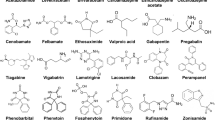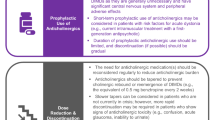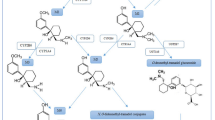Opinion statement
Seizure aggravation by antiepileptic drugs (AEDs) is an overestimated phenomenon. While it undoubtedly occurs, the quality of evidence in most published reports is poor. Although seizure aggravation can be examined in clinical trials in the same way as seizure improvement, this is rarely done. Before concluding that an increase in seizures after the introduction of a new drug represents pharmacodynamic aggravation, alternative explanations should be explored. These include spontaneous fluctuation of seizure frequency, the presence of known seizure aggravators (such as sleep deprivation, alcohol, and psychotropic medications), progression of epilepsy, the development of drug resistance, and replacement of a partially effective drug with a less effective drug. The risk of incorrectly blaming a drug for a deterioration in seizures can be minimized by establishing baseline seizure frequency over a period long enough to encompass the extremes of seizure fluctuation and by educating the patient that a temporal relationship may not be a causal relationship. When feasible, the patient should continue the drug long enough to establish if the deterioration is transient. If the drug is stopped, rechallenge should be considered. The risk of seizure aggravation can be minimized by accurate diagnosis of the epilepsy syndrome and appropriate choice of AED.
Similar content being viewed by others
References and Recommended Reading
Bauer J: Seizure-inducing effects of antiepileptic drugs: a review. Acta Neurol Scand 1996, 94:367–377.
Genton P, McMenamin J: Can antiepileptic drugs aggravate epilepsy? Epilepsia 1998, 39(Suppl 3):S1-S29.
Chaves J, Sander JW: Seizure aggravation in idiopathic generalized epilepsies. Epilepsia 2005, 46(Suppl 9):133–139.
Genton P: When antiepileptic drugs aggravate epilepsy. Brain Dev 2000, 22:75–80.
Guerrini R, Belmonte A, Genton P: Antiepileptic druginduced worsening of seizures in children. Epilepsia 1998, 39(Suppl 3):S2-S10.
Perucca E, Gram L, Avanzini G, Dulac O: Antiepileptic drugs as a cause of worsening seizures. Epilepsia 1998, 39:5–17.
Somerville ER: Aggravation of partial seizures by antiepileptic drugs: is there evidence from clinical trials? Neurology 2002, 59:79–83. Standard clinical trial methodology is used to examine seizure aggravation with tiagabine, topiramate, and levetiracetam by analyzing seizure increases instead of decreases, using data from clinical trials of efficacy. It also illustrates the extent of spontaneous fluctuation of seizures by examining patients taking placebo.
Nakken KO, Eriksson AS, Lossius R, Johannessen SI: A paradoxical effect of levetiracetam may be seen in both children and adults with refractory epilepsy. Seizure 2003, 12:42–46.
Krishnan PR, Tripathi M, Jain S: Seizure worsening with topiramate amongst Indians with refractory epilepsy. Eur J Neurol 2003, 10:515–519.
Mikaeloff Y, de Saint-Martin A, Mancini J, et al.: Topiramate: efficacy and tolerability in children according to epilepsy syndromes. Epilepsy Res 2003, 53:225–232.
Kelly K, Stephen LJ, Brodie MJ: Levetiracetam for people with mental retardation and refractory epilepsy. Epilepsy Behav 2004, 5:878–883.
Horn CS, Ater SB, Hurst DL: Carbamazepine-exacerbated epilepsy in children and adolescents. Pediatr Neurol 1986, 2:340–345.
So EL, Ruggles KH, Cascino GD, et al.: Seizure exacerbation and status epilepticus related to carbamazepine-10,11-epoxide. Ann Neurol 1994, 35:743–746.
Genton P, Gelisse P, Thomas P, Dravet C: Do carbamazepine and phenytoin aggravate juvenile myoclonic epilepsy? Neurology 2000, 55:1106–1109. This series provides Class III evidence for aggravation of juvenile myoclonic epilepsy by phenytoin and especially carbamazepine. It also shows that although most patients deteriorated, some responded favorably.
Parmeggiani L, Seri S, Bonanni P, Guerrini R: Electrophysiological characterization of spontaneous and carbamazepine-induced epileptic negative myoclonus in benign childhood epilepsy with centro-temporal spikes. Clin Neurophysiol 2004, 115:50–58.
Seymour JF: Carbamazepine overdose. Features of 33 cases. Drug Saf 1993, 8:81–88.
Spiller HA, Carlisle RD: Status epilepticus after massive carbamazepine overdose. J Toxicol Clin Toxicol 2002, 40:81–90.
Depaulis A, Deransart C, Vergnes M, Marescaux C: GABAergic mechanisms in generalized epilepsies: the neuroanatomical dimension. Rev Neurol (Paris) 1997, 153(Suppl 1):S8-S13.
Cortez MA, McKerlie C, Snead OC3rd: A model of atypical absence seizures: EEG, pharmacology, and developmental characterization. Neurology 2001, 56:341–349.
McLean KJ, O’Brien TJ, Cook MJ, Vajda FJ: The influence of gender on the aggravation of absence seizures by carbamazepine in the low-dose pentylenetetrazol rat model. Seizure 2004, 13:208–216.
Gelisse P, Genton P, Kuate C, et al.: Worsening of seizures by oxcarbazepine in juvenile idiopathic generalized epilepsies. Epilepsia 2004, 45:1282–1286.
Hahn A, Fischenbeck A, Stephani U: Induction of epileptic negative myoclonus by oxcarbazepine in symptomatic epilepsy. Epileptic Disord 2004, 6:271–274.
Koepp MJ, Edwards M, Collins J, et al.: Status epilepticus and tiagabine therapy revisited. Epilepsia 2005, 46:1625–1632.
US Food and Drug Administration: Public health advisory. Seizures in patients without epilepsy being treated with Gabitril (tiagabine). http://www.fda.gov/cder/drug/advisory/ gabitril.htm. Accessed February 23, 2006.
van LuijtelaarEL, Drinkenburg WH, van Rijn CM, Coenen AM: Rat models of genetic absence epilepsy: what do EEG spike-wave discharges tell us about drug effects? Methods Find Exp Clin Pharmacol 2002, 24(Suppl D):65–70.
Guerrini R, Dravet C, Genton P, et al.: Lamotrigine and seizure aggravation in severe myoclonic epilepsy. Epilepsia 1998, 39:508–512.
Matsuo F, Bergen D, Faught E, et al.: Placebo-controlled study of the efficacy and safety of lamotrigine in patients with partial seizures. U.S. Lamotrigine Protocol 0.5 Clinical Trial Group. Neurology 1993, 43:2284–2291.
Tassinari CA, Dravet C, Roger J, et al.: Tonic status epilepticus precipitated by intravenous benzodiazepine in five patients with Lennox-Gastaut syndrome. Epilepsia 1972, 13:421–435.
Somerville ER, Bruni J: Tonic status epilepticus presenting as confusional state. Ann Neurol 1983, 13:549–551.
Livingston JH, Anderson A, Brown JK, McInnes A: Benzodiazepine sensitivity testing in the management of intractable seizure disorders in childhood. Electroencephalogr Clin Neurophysiol 1987, 67:197–203.
Asconape J, Lancman M, Oles K: Carbamazepinerelated hyponatremia: risk factors and clinical consequences. Epilepsia 1996, 37(Suppl 5):152.
Gabapentin in partial epilepsy. UK Gabapentin Study Group. Lancet 1990, 335:1114–1117.
Anhut H, Ashman P, Feuerstein TJ, et al.: Gabapentin (Neurontin) as add-on therapy in patients with partial seizures: a double-blind, placebo-controlled study. The International Gabapentin Study Group. Epilepsia 1994, 35:795–801.
Brooks-Kayal AR: Rearranging receptors. Epilepsia 2005, 46(Suppl 7):29–38.
Panayiotopoulos CP, Tahan R, Obeid T: Juvenile myoclonic epilepsy: factors of error involved in the diagnosis and treatment. Epilepsia 1991, 32:672–676.
Inoue Y: Treatment guidelines for epilepsy. No To Shinkei 2005, 57:195–201.
Semah F, Picot MC, Derambure P, et al.: The choice of antiepileptic drugs in newly diagnosed epilepsy: a national French survey. Epileptic Disord 2004, 6:255–265.
Karceski S, Morrell MJ, Carpenter D: Treatment of epilepsy in adults: expert opinion, 2005. Epilepsy Behav 2005, 7(Suppl 1):S1-S64; quiz S65-S67.
Hirsch E, Genton P: Antiepileptic drug-induced pharmacodynamic aggravation of seizures: does valproate have a lower potential? CNS Drugs 2003, 17:633–640.
Benbadis SR: Practical management issues for idiopathic generalized epilepsies. Epilepsia 2005, 46(Suppl 9):125–132.
Bourgeois BF: Chronic management of seizures in the syndromes of idiopathic generalized epilepsy. Epilepsia 2003, 44(Suppl 2):27–32.
Author information
Authors and Affiliations
Rights and permissions
About this article
Cite this article
Somerville, E.R. Seizure aggravation by antiepileptic drugs. Curr Treat Options Neurol 8, 289–296 (2006). https://doi.org/10.1007/s11940-006-0019-5
Issue Date:
DOI: https://doi.org/10.1007/s11940-006-0019-5




